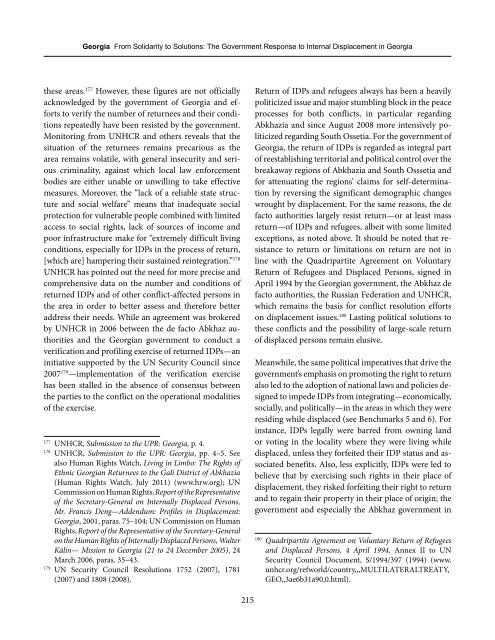From Responsibility to Response: Assessing National - Brookings
From Responsibility to Response: Assessing National - Brookings
From Responsibility to Response: Assessing National - Brookings
Create successful ePaper yourself
Turn your PDF publications into a flip-book with our unique Google optimized e-Paper software.
Georgia <strong>From</strong> Solidarity <strong>to</strong> Solutions: The Government <strong>Response</strong> <strong>to</strong> Internal Displacement in Georgia<br />
these areas. 177 However, these figures are not officially<br />
acknowledged by the government of Georgia and efforts<br />
<strong>to</strong> verify the number of returnees and their conditions<br />
repeatedly have been resisted by the government.<br />
Moni<strong>to</strong>ring from UNHCR and others reveals that the<br />
situation of the returnees remains precarious as the<br />
area remains volatile, with general insecurity and serious<br />
criminality, against which local law enforcement<br />
bodies are either unable or unwilling <strong>to</strong> take effective<br />
measures. Moreover, the “lack of a reliable state structure<br />
and social welfare” means that inadequate social<br />
protection for vulnerable people combined with limited<br />
access <strong>to</strong> social rights, lack of sources of income and<br />
poor infrastructure make for “extremely difficult living<br />
conditions, especially for IDPs in the process of return,<br />
[which are] hampering their sustained reintegration.” 178<br />
UNHCR has pointed out the need for more precise and<br />
comprehensive data on the number and conditions of<br />
returned IDPs and of other conflict-affected persons in<br />
the area in order <strong>to</strong> better assess and therefore better<br />
address their needs. While an agreement was brokered<br />
by UNHCR in 2006 between the de fac<strong>to</strong> Abkhaz authorities<br />
and the Georgian government <strong>to</strong> conduct a<br />
verification and profiling exercise of returned IDPs—an<br />
initiative supported by the UN Security Council since<br />
2007 179 —implementation of the verification exercise<br />
has been stalled in the absence of consensus between<br />
the parties <strong>to</strong> the conflict on the operational modalities<br />
of the exercise.<br />
177 UNHCR, Submission <strong>to</strong> the UPR: Georgia, p. 4.<br />
178 UNHCR, Submission <strong>to</strong> the UPR: Georgia, pp. 4–5. See<br />
also Human Rights Watch, Living in Limbo: The Rights of<br />
Ethnic Georgian Returnees <strong>to</strong> the Gali District of Abkhazia<br />
(Human Rights Watch, July 2011) (www.hrw.org); UN<br />
Commission on Human Rights, Report of the Representative<br />
of the Secretary-General on Internally Displaced Persons,<br />
Mr. Francis Deng—Addendum: Profiles in Displacement:<br />
Georgia, 2001, paras. 75–104; UN Commission on Human<br />
Rights, Report of the Representative of the Secretary-General<br />
on the Human Rights of Internally Displaced Persons, Walter<br />
Kälin— Mission <strong>to</strong> Georgia (21 <strong>to</strong> 24 December 2005), 24<br />
March 2006, paras. 35–43.<br />
179 UN Security Council Resolutions 1752 (2007), 1781<br />
(2007) and 1808 (2008).<br />
215<br />
Return of IDPs and refugees always has been a heavily<br />
politicized issue and major stumbling block in the peace<br />
processes for both conflicts, in particular regarding<br />
Abkhazia and since August 2008 more intensively politicized<br />
regarding South Ossetia. For the government of<br />
Georgia, the return of IDPs is regarded as integral part<br />
of reestablishing terri<strong>to</strong>rial and political control over the<br />
breakaway regions of Abkhazia and South Osssetia and<br />
for attenuating the regions’ claims for self-determination<br />
by reversing the significant demographic changes<br />
wrought by displacement. For the same reasons, the de<br />
fac<strong>to</strong> authorities largely resist return—or at least mass<br />
return—of IDPs and refugees, albeit with some limited<br />
exceptions, as noted above. It should be noted that resistance<br />
<strong>to</strong> return or limitations on return are not in<br />
line with the Quadripartite Agreement on Voluntary<br />
Return of Refugees and Displaced Persons, signed in<br />
April 1994 by the Georgian government, the Abkhaz de<br />
fac<strong>to</strong> authorities, the Russian Federation and UNHCR,<br />
which remains the basis for conflict resolution efforts<br />
on displacement issues. 180 Lasting political solutions <strong>to</strong><br />
these conflicts and the possibility of large-scale return<br />
of displaced persons remain elusive.<br />
Meanwhile, the same political imperatives that drive the<br />
government’s emphasis on promoting the right <strong>to</strong> return<br />
also led <strong>to</strong> the adoption of national laws and policies designed<br />
<strong>to</strong> impede IDPs from integrating—economically,<br />
socially, and politically—in the areas in which they were<br />
residing while displaced (see Benchmarks 5 and 6). For<br />
instance, IDPs legally were barred from owning land<br />
or voting in the locality where they were living while<br />
displaced, unless they forfeited their IDP status and associated<br />
benefits. Also, less explicitly, IDPs were led <strong>to</strong><br />
believe that by exercising such rights in their place of<br />
displacement, they risked forfeiting their right <strong>to</strong> return<br />
and <strong>to</strong> regain their property in their place of origin; the<br />
government and especially the Abkhaz government in<br />
180 Quadripartite Agreement on Voluntary Return of Refugees<br />
and Displaced Persons, 4 April 1994, Annex II <strong>to</strong> UN<br />
Security Council Document, S/1994/397 (1994) (www.<br />
unhcr.org/refworld/country,,,MULTILATERALTREATY,<br />
GEO,,3ae6b31a90,0.html).

















